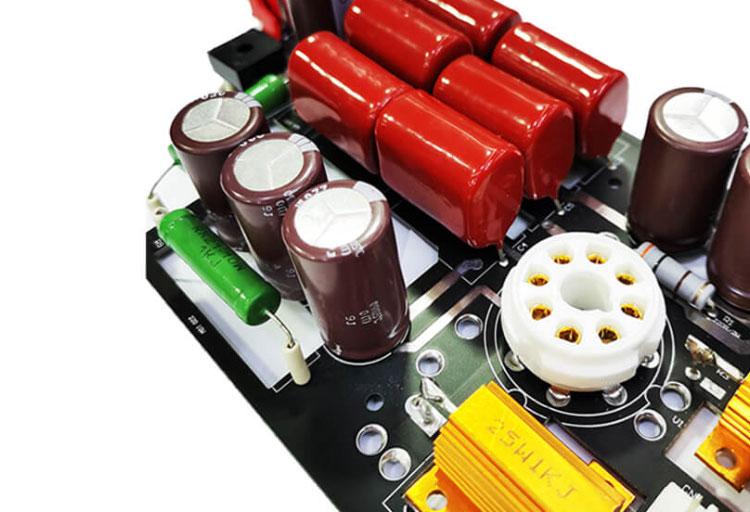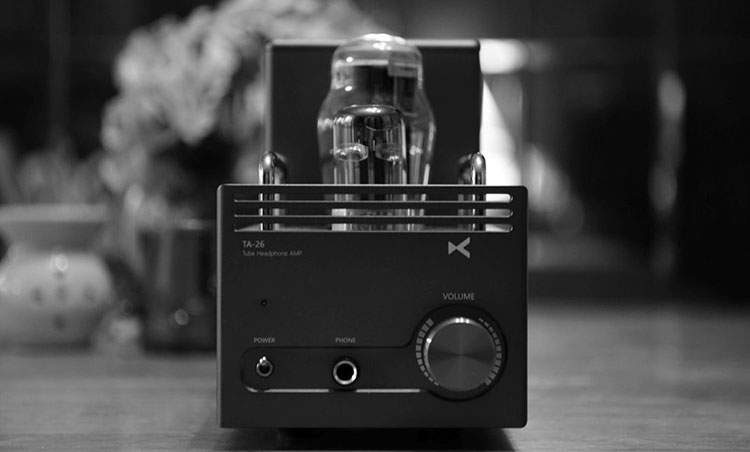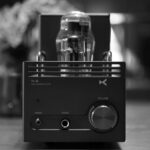Our review of the xDuoo TA-26 is a high-powered desktop headphone tube amplifier with a dual 6N8P pre-amp and 6N5P buffer. It is priced at $319.
Disclaimer: This is a sample sent to us in exchange for our honest opinion. Headfonics is an independent website with no affiliate links or services. Thank you to xDuoo and Linsoul for giving us this opportunity.
To read more about Xduoo products featured on Headfonics click here.
Note, this article follows our latest scoring guidelines which you can read up on here.
xDuoo is a popular brand in the audiophile world with a wide range of mainly amplifiers and source gear for headphones and IEM users.
We have covered quite a bit down through the years such as the recent MT-604, the XA-10, and the cheaper TA-10 amplifier. They are prolific in their output so, you can expect them to release a steady line of great budget to middle-tier products each year.
As both a consumer and an audio journalist, having so many options really make me quite happy. Today, we will be looking into their newer TA-26, which is a $319 desktop tube headphone amplifier.

Tech Highlights
This is an analog amplifier product, so that means no source function. This is not a DAC + Amplifier. It offers excellent output levels of power and voltage, rated at 500mW into 600/300Ω so HD800/600 Series users should take note.
What does that mean exactly? Well, it can drive power-hungry headphones like the Sennheiser HD800 fairly well. If you have very needy Planar Magnetic-styled headphones, you should still be covered more than adequately by this amp for your driving power needs.
However, the TA-26 does have the chops to drive extremely power-hungry headphones though, such as the Hifiman HE6SE.
So long as you aren’t using a headphone regarded as bordering on the extreme in driving requirements, you will be more than well off with the TA-26. The amp can also be used as a passive preamp for your speakers or a much better amplifier if need be.
Ground Noise
Has anyone else really even noticed that most amplifiers and DACs in the past few years have become near totally silent and absent ground noise?
I remember the days of using extremely expensive amps only to come away thinking I can still hear some hiss and grounding interference.
Such is no longer the case in the modern amplifier world and I couldn’t be happier. For $319, you can’t go wrong here if you own headphones with some proneness to hum on the ground floor.
If that is the case, I would be recommending amplifiers that reduce that as much as possible, or that are known to get rid of it entirely. This is a tube amplifier, and with tubes comes some potential for some background noise.
However, the TA-26 is very quiet, all things considered. It isn’t totally silent, but it is in the excellent tier for my standards with regard to ground noise in the sonic void.
Compared to the Drop LDAC amp I have here, the TA-26 is slightly audibly noisier but it is not enough to hear it while music is playing. I required a dead silent room and an HD800 headphone just to even pick it up.
Tubes
This amplifier runs on a 6N8P tube family for the pre-out function. This is a fairly common type of tube without any special qualities to it that made it stand out from other tubes that sell for about $18-20usd a piece.
But what does stand out, again, is the quiet factor. This set is known in some tube forums as a solidly quiet tube set.
Beyond that, the primary amp circuit runs on a 6N5P. This tube runs about $4-5 a pop. Interestingly enough, I do not recall ever using this tube or hearing it in the past though I do know that they are the same tubes inside the popular DarkVoice 336SE OTL headphone amplifier and it does have a similar aesthetic to it.
Design
This amplifier is damned heavy. Holy hell, it is almost 4KG in weight. For being relatively small to moderate in its physical dimensions, the weight factor is extreme.
The entire chassis is a huge thick piece of aluminum…and I mean this is a real thick boy! The exterior is also sandblasted to a smooth finish. Xduoo has told me that the selective materials of the chassis were purposely used to detract external interference. I can’t really test that in a lab without removing all the parts, so I will just have to trust them on it.
xDuoo also mentions the volume knob is a solid piece of metal and it certainly feels like it. I have a thing for big knobs that feel weighted and satisfying, (yes, I know how that read!). To me, it invokes a higher sense of appeal that feels higher end in terms of value.
Subjective Paradox
This amplifier looks like a higher-tier monoblock, the type you see in pictures of high-end setups. Despite that, I think the aesthetics of the amplifier are not up to par.
To me, this is a paradox because I feel I want to brandish the amp for all to see it due to it looking expensive. But this is a case where I feel the design of the amplifier is not pleasing to the eye at the same time.
I am very unfond of this design from a visual standpoint. I think the knob color really offsets the styling of the rest of the amplifier chassis. Despite that, I feel the physical build is A+ tier due to being a heft thick cut of metal.
Retro
I want others to see this on my desk because it looks like a retro monoblock. But at the same time, those things were not attractive in the slightest to me.
I want the prestige of others thinking the amp is much more expensive than it actually is but at the same time the visual appeal is not what I would call awe-inspiring.
People don’t like the old-looking monoblocks and retro gear from the 80s and early 80s because they are beautiful. They adore them for the tonality and sound they can offer and that sense of style invokes yet more sense of higher-tier sound quality. “she isn’t pretty, but everyone knows she is amazing.”
Packaging & Accessories
No accessories are given with this package beyond the stock power cable, which is quite beefy.
The Dragon Level III came in a standard cardboard box with foam cutouts to protect the amplifier. It doesn’t come with a supremely fancy package beyond that. Not that I need or even want one…I don’t think anyone will care about the box after listening to the product.
This amplifier is so gorgeous that I would want it brandished on my desk and listening area at all times, never covered or placed in a box unless I was transporting it anyway.
Sound Impressions
Bass
xDuoo has always been about balancing out the sound field for enthusiasts who buy their products. Sometimes, you get a bass booster switch, sometimes you don’t. In this case, no booster. However, plenty of the portable options from this company offered it.
In this case, you don’t really need it. Do a bit of research on bassy tube replacements for the 6N5P family. I am sure something exists out there with more bass than usual if you are a bass demon, like me.
To my delight, the TA-26 paired immensely well with the Swansong Audio open-back headphone. That extra oomph sound yonder felt really good and the natural feeling tone of this headphone is matched by the TA-26’s highly musical low end.
Despite that, I find the stock sound with no EQ active as something more than satisfactory in the quantity of the low end. That means those bass enthusiasts out there should like the quantity of bass that comes out of this product.
No, it is not bass-head-worthy, but I feel like the entire spectrum is elevated here. By that, I mean the bass is boosted in stock form, the mids are forward, and the treble is tamed but still enjoyable in quantity. Seems like everything is raised up a notch or two.
Midrange
As just mentioned, the vocal experience is quite forward. Usually, the xDuoo’s are more linear feeling in placement, more relaxed, but not recessive. They are also not known to be overly forward and in your face either.
But I feel like this is a great amplifier for the Beyerdynamic T5 Gen3, which is a soothing soft midrange headphone. This is a great pairing! The extra bite factor of the TA-26 livens up the T5 but the smoothness factor remains in the areas of softness that are enjoyable.
This is not a headphone amplifier that I found to mesh with my Sennheiser HD800. The reason is that the HD800, (mine is the Drop HD8xx version), is very wide and recessed feeling. That is the opposite sound trait setup of the TA-26.
Of course, fidelity is good for the price through the HD8xx and TA-26 mix. As a steppingstone amp? No problem, I’d still recommend it for someone who has the HD800 series model who is looking for a warmer than usual Tube amplifier.
The midrange is forward and moderate in punch factor, so it neither hits hard nor makes you wince, and it also is not overly soft. It will mesh with most headphone options out there on a neutral level.
Treble
The top-end certainly has a bit of bite to it and that comes with most tube amplifiers, at least I think so.
This tube set is not a “very soft” and flowing feeling. It is more of a neutrally tamed treble that is not hostile, even with the HD800, which is a headphone that is regarded as having hostile treble. Despite that, the HD8xx I have here sounded enjoyable through the TA-26.
True, the HD8xx scales up significantly beyond what the TA-26 can offer, but for starting out, this is a great option still. Tame that treble hotness but don’t engage into icy painful wince-worthy treble impact.
And that is exactly what the TA-26 did. You can retain quality and enjoyability without sullying the sound and not going into OWIE territory. More and more amps these days are invoking this styling and I am so happy about that.
Staging & Dynamics
Burson’s Funk is a roughly $500 headphone and speaker amplifier, it sounds noticeably wider and more focused.
However, the TA-26 sounds taller and more shapeless in physicality factor. The TA-26 is the amplifier I would be pairing with that T5 and most other headphones I have that are not known for exceptionally wide and deep sound.
The xDuoo field is not one that is regarded as offering exceptional staging prowess but, in this case, due to being a tube amplifier, there is more air factor than usual and that lends some extra imaging points to the experience. It feels lighter, airier than the LDAC and the Funk, all three are roughly the same price tier.
Again, for $319, you can’t go wrong with a nice fluffy sound in a tube amplifier with some warmth on the bottom end. This is a very relaxing sound to me.
Synergy
Since there are no gain switches or bass boost toggles, just a power switch, the Synergy factor really relies on your tube selection potentials. You can alter the sound if you take the time to invest in finding a set of tubes that you like.
Despite the TA-26 not sounding widefield in imaging factor, it does retain plentiful coherency and is what I would regard as a fantastic steppingstone.
As a Preamp, this is an even better option. I run this as a preamp out of my xDuoo X3 II player and into my Stax D10 amplifier as the middleman to clean up the sound on the X3 before it arrives at the D10. The combo is excellent. That extra warmth factor helps a lot for me, as I prefer musicality over clinical tonality.
The amp is also plenty powerful and most of the newer mid-tier to higher tier IEMs don’t have sensitivity issues. So, you can use them with the TA-26 and not worry about hiss factor being a huge problem.
Overall, the TA-26 is a generalist that scores high on the synergy factor. Yea, it hurts a bit for me not to have that bass booster or gain switch like some of the lesser-priced portables from xDuoo have, but I digress.
Preamp Wonders
This unit was designed to play well as a preamp and I will be recommended it for people interested in a $319 tube preamp setup. This is a “Feature” on the TA-26, I suppose. But it isn’t something I cannot do with any other amplifier in the same pricing tier and still achieve great results.
Yes, it is a dedicated preamp output via RCA, but my tests resulted in absolutely no fidelity differences when swapping out the TA-26 in my rig with the LDAC or the Funk. Those aren’t even preamps.
Just a double amping from my Source to the Funk or the LDAC, set to a specific volume, and then outsourced to the speakers and the much better headphone rig. I could not hear a lick of a difference in the fidelity.
However, you can generally hear a difference in tone warmth, a bit extra bass, and a more aired-out appeal on the top side when the TA-26 is used in the middle. And that is likely because it is a tube amp that has more airiness than the solid-state Funk and LDAC.
So, is this really a feature when this same thing can be achieved with other non-dedicated preamps? Yes and no. Depends on your rig and what you are after. For me, the TA-26 helps out the bass depth and a musical topside most of the time.
So, in that sense, it is valued as a preamp for my Magnepan speakers and also for my more expensive headphone rigs. The problem is that I can get the same result by using my older XRK portable amplifier as a “preamp” in the same setups and I cannot tell the difference between that used as a preamp and the TA-26 used as a preamp.
Select Comparisons
Burson Funk
The Funk derives more of a sense of width factor, while the TA-26 offers a less widened appeal to the imaging. Despite that, the TA-26 sounds more aired out and lighter than the denser feeling Funk.
I would be opting for the HD8xx on the Burson due to the width factor in imaging needs, but I would probably be using the TA-26 for the T5 and most other headphones, if not all other headphones I currently have. That extra width factor is not totally noticeable on other headphones when A/Bing the Funk to the TA-26.
By that, I mean that when I do not use the HD8xx to test, I can’t easily tell the width factor of the soundstage differences between both amplifiers.
The results are not enough to gripe about and require real focus to even hear. However, you can easily pick up the light and airy tone of the xDuoo vs the much denser feeling treble factor on the Funk.
Drop Grace Design LDAC LCX
Drop’s Grace Design LDAC LCX is a solid little unit that is a great all-around capability. It has features and outputs on it that the TA-26 doesn’t have. Feature-rich vs spartan, which I found to be a bit upsetting.
Yea, it is a $319 unit and I don’t expect the world out of it, but I really would like something else beyond just a volume knob, a power switch, and the headphone port.
A bass switch would be great, if the cheaper and smaller portables from xDuoo can do this, I want all their full-size amps to do it as well because I almost prefer the 05-model portable…which had a slew of amazing features on it.
The LDAC sounds sterile by comparison. Totally flat feeling in tone and physical setup. It also is less clean sounding but has a better driving potential for balanced headphones with that XLR output. It also feels lacking in depth of field of imaging compared to the TA-26.
Our Verdict
The TA-26 is an affordable, well-built, if somewhat of a beefy little amplifier. This is exactly what I want on my desk to show off to others.
I WANT that retro weird blocky style. I want it to look very different from most other amplifiers and something interesting to look at and talk about. It looks chunky in a punk sort of way.
Visually, the design is powerful and striking but it has an appeal of not being visually elegant at the same time and that is why I like it.
Yes, I just said I like it because it is unattractive. It looks like a little beast and it really is very well-rounded for the price. Can’t go wrong here in terms of value to performance. I also felt like it is one of the better preamps I could set up my Stax headphones with.
xDuoo TA-26 Specifications
- Power Supply: AC100~120V/220~240V
- Output Power: 500mW (600/300Ω load)
- Frequency Response: 10Hz~30KHz (± 0.5dB)
- Gain: +16dB
- S/N: 110dB
- THD+N: ≤0.1% (1KHz)
- Suitable Headphone Impedance: 60Ω~600Ω
- Size: 25x11x16cm
- Weight: 3.9Kg










